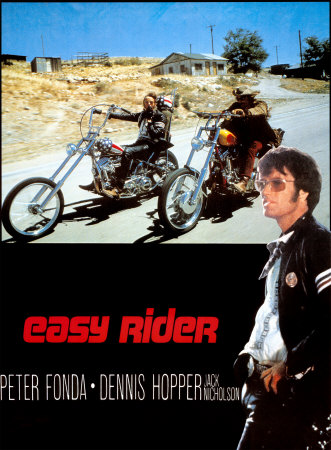
EASY RIDER
US, 1969, 92 minutes, Colour.
Peter Fonda, Dennis Hopper, Jack Nicholson.
Directed by Dennis Hopper.
Easy Rider was one of the surprise films of the 60's. It was made independently on a small budget and grossed millions at the box-office. The success of the film gave encouragement to independent film-makers and the studios then came out with their imitation bikie films.
Easy Rider, however, is a good film. It shows us two contemporaries taking the American highway to peddle drugs. Their vehicle is the individualistic motorbike and their ride leads them through countryside and town, hippy commune, farm, Southern white prejudice to the New Orleans Mardi Gras.
While the two heroes, Wyatt (Earp-Captain America clothes) and Billy (the Kid-cowboy clothes) think that they are typical and that they are free, they are not completely free. Billy wants to settle down rich in Florida. Wyatt says that they blew the trip. In the end they are killed. The film is one of exploration rather than answers and many of the encounters along the highway are very well done.
The most famous encounter is that with the lawyer, George (Jack Nicholson), who joins them for the ride, makes set satirical speeches about the nature of freedom in the United States. And then he, too, is killed.
The film uses modern music throughout and the photography is very good, especially in communicating the free-wheeling freedom of the bike.
People have objected to the presentation of drugs in the film as normal. There is also a bad trip visualised during their stay in New Orleans.
The three stars became famous at once, although they had been in films for years. Jack Nicholson went on from this to Five Easy Pieces and an extraordinary career. Whether one likes Easy Rider or not, it offers plenty of 1960s Issues to discuss.
1. The popularity and commercial success of this film?
2. Was freedom the main theme of the film? Why?
3. Were Wyatt and Billy real heroes? (Wyatt Earp and Billy the Kid looking like Captain America and Midnight Cowboy)? What did each of them stand for? What values did they have? Were they searching for more? What were they looking for?
4. What contribution did the music and the songs make to the film?
5. How did the film communicate the individualistic exhilaration of riding the highway? What did this easy-riding symbolize? What do bikes represent to-day?
6. Although they were drug peddling and they taught George to smoke marijuana, were drugs a large issue in the film or not?
7. What did the opening of the film suggest - old-world
Mexican profiles contrasting with the jets, drugs, the rich and the poor, bikies? Were these early indications followed up?
8. Did the film give a clear picture of the cross-section of American society? How did Wyatt Earp and Billy react to:
- the farmer with his spread, 'doing his own thing in his own time} you ought to be proud'
- the blacksmith who compares his trade and the bikies
- the commune people, trying to live from the earth and share work and endowments
- the marching girls and the town parade
- the cafe manager and the local girls?
Wyatt emerges as more sympathetic! Why?
Billy emerges as uncomprehending and selfish. Why?
9. What aspects of American society did George represent? What did his escape and riding with them mean?
10. What was the significance of George's speech on freedom, the talk about freedom and yet the fear of it by society, the fear of free individuals as violent and dangerous? How did he satirise the complacent citizen in his speech about the Venusian infiltration and the trust that the government knows all about it and will look after them. "This used to be a helluva good country. What went wrong?"
11. Why Was George killed and not Wyatt and Billy?
12. What was the significance of the meal for George and the plaques about reputation and death (and the flash-forward to the road, to the fire by the road which was their death)?
13. How did the New Orleans whorehouse show Billy for what he was - just after money, sex and comfortable retirement to Florida?
14. How did New Orleans affect Wyatt - a bad trip. "We blew it." What did he mean?
15. Why was the New Orleans' Mardi Gras, and bad trip, given religions overtones? Lust in a cemetery, death and imprisonment in a dark corridor,
16. Was the end a caricature, Wyatt and Billy being shot? Was it merely symbolic, the country pot-shatters frightening and killing the rebels on the bike? Or, in the U.S. of the 60's was this realistic?
17. Was this a good film? Did it give insight into people, freedom, life?